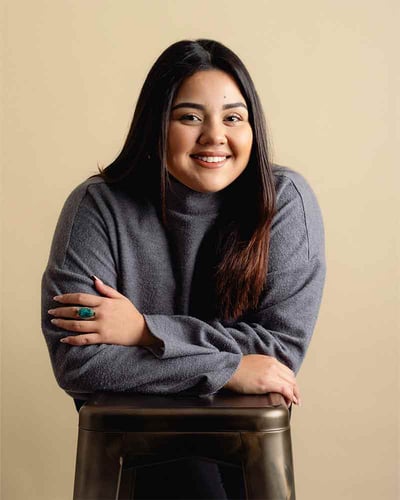Becoming the First
Trevecca senior Fatima Vargas has spent her entire life learning how to use her voice.
Born in the United States to Mexican parents who immigrated 23 years ago, she quickly became bilingual and began translating for her mom and dad as soon as she was old enough to talk. Whether at the grocery store or during a parent-teacher conference, she bridged the gap. “That was my role growing up,” she explained.
Vargas’ dad started a painting business and her mom began catering after they moved to the Nashville area. Soon, her mom’s company, La Bamba, became a family affair. The Vargases now operate two food trucks from April through November, selling Mexican cuisine at local soccer fields. “My mom makes the food while I’m up front taking orders and greeting people,” she said.
This spring, Vargas will graduate with a Bachelor of Science in social justice and a minor in public policy. She is one of a growing number of Trevecca undergraduate students who are the first in their families to attend college. In fact, 16 percent of this year’s freshman class are first-gen students.
Impact Beyond the Classroom
During her years at Trevecca, Vargas has once again found an opportunity to use her voice. This time she’s speaking for both the immigrant population in Nashville and for students like her on campus who are navigating the unfamiliar world of higher education.
Now working part-time for the Tennessee Immigrant and Refugee Rights Coalition (TIRRC), Vargas spent much of her free time last summer and into election season as a volunteer civic engagement coordinator. She enjoys talking with people, learning about their experiences and encouraging eligible immigrants to vote to get involved.
The issues most concerning to Vargas are the affordable housing crisis in Nashville and immigrant and refugee access to education, health resources, language-learning opportunities and legal services.
The political complexities of immigration are personal to Vargas. “Being raised in a mixed-status family, there’s been a constant fear of the possibility of me and my parents getting separated, or of them getting pulled over by law enforcement or even them facing the possibility of deportation,” she said. “Since I had the privilege of being born in the U.S., I feel like it’s my responsibility to amplify their voices and needs.”
Vargas has also found a way to amplify the needs of other first-gen students at Trevecca through her role as president of the First Generation Council, a new organization that aims to support students who are trying to learn how to qualify for scholarships, pay tuition, apply for internships, plan their class schedules or even change their major. While these tasks may seem easy to some, for first-gen students it’s all new.
“Having a supportive community who can help students with these things makes all the difference—I know it did for me,” Vargas said.
Campus Influences
Vargas’ academic advisor and professors came around Vargas in a way that made her feel seen.
“I felt they genuinely cared about me,” Vargas remarked. “They wanted to know my story. I knew I could turn to them whenever I didn’t know where to go or what to do. My parents didn’t go to college, so I needed to find that kind of support community, and the people who I found it with are very valuable to me. They’ve been my biggest mentors.”
For first-gen students, finding that kind of belonging is everything, Vargas says, and that’s the reason she became a leader with the First Generation Council. The council regularly meets to foster community or offer educational talks where students can learn everything from how to file taxes, complete social security documents or learn how to best engage with their academic advisor.
“Our goal is to be there for them or direct them to someone who can help them with whatever they are facing,” Vargas said. “It’s so important for students to have a mentor and for them to not be scared to ask for help.”
On Mission as a Volunteer
Because Vargas found the support she needed, she’s been able to not only make the most of her time at Trevecca but find ways to give back, volunteering with groups like People Loving Nashville and Room in the Inn, which support Nashville’s low-income and homeless populations. In addition to her work with TIRRC, she has also interned with Catholic Charities.
“I recently served as a mentor with Catholic Charities to a refugee family who’d just arrived in the U.S. from Afghanistan,” Vargas explained. “I’d take them grocery shopping, connect them with the health clinic or offer to run errands. I felt honored to do that, but it was hard for me to see them struggle to adapt. They didn’t know the language.”
This gave Vargas a newfound appreciation for what her own parents faced when they moved to the U.S. two decades ago. It also fueled her desire to continue investing in those who need support and representation.
Whether that happens through finding meaningful work after graduation or pursuing a graduate degree in law or organizational leadership, Vargas plans to continue growing and giving back.
Most importantly, she’ll keep using her voice to help others.
